Today
Trapped in terror: Three Ukrainian women held hostage by Russian soldiers speak out
Danielle Campoamor – April 19, 2022
On March 3, Russian forces took hold of Yahidne, a small village outside of Chernihiv, Ukraine, and held the villagers captive in a school basement for 25 harrowing days.
Ukrainian survivors believe at least 20 people died during the month-long Russian occupation, including 11 elderly villagers who passed away while inside the basement. No official death toll has been released by Ukrainian officials.
Surviving off limited food and forced to go to the bathroom in buckets, men, women and children huddled together — four people per square meter — as Russian forces ransacked and destroyed their homes. Adults slept sitting up, while mothers used their bodies as makeshift beds for their children. The youngest Ukrainian held captive was just 2 months old.
To keep track of time, villagers etched the passing days into one of the basement walls.
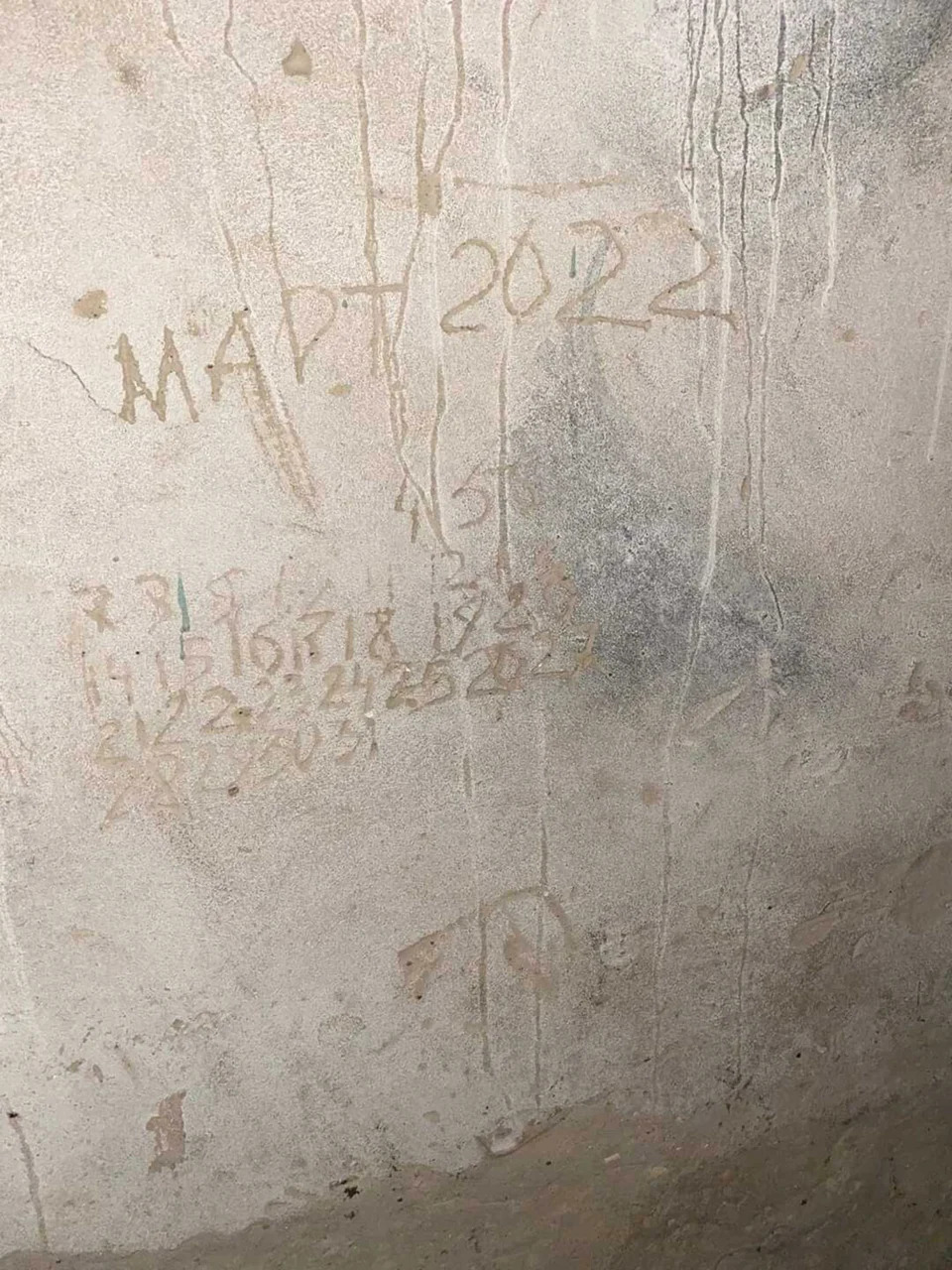
TODAY Parents spoke, through a translator, to three Ukrainian women who were held captive by Russian troops in Yahidne and described, in detail, the conditions of their imprisonment. Now liberated, they say they want to world to know what the Russian military did to their homes, their village and their families.
The Defiant Grandmother
Valentyna Lohvynchuk, 56, told TODAY Parents Russians began shelling her village on the first day of March. Afraid, she hid in the cellar in the basement of her home with others from her village. They stayed in the basement until March 3 when, at around 4 pm, Russian soldiers came to her home.
“At first they were just shooting everywhere around — we could hear them from the basement,” Lohvynchuk told TODAY Parents. “Then they opened the basement doors and immediately threw something small inside: Some small explosive package.”
Related: Russian missile destroys José Andrés’ World Central Kitchen restaurant in Ukraine
Lohvynchuk and the others began to cry out, begging the soldiers not to shoot.
“We started crying, yelling, ‘Please, do not kill us. Here in the basement, you can see it’s only women and children,'” she explained. “Then they said, ‘OK. Actually, we came here to protect you.'”
The soldiers took the women and children from their home, rounding up all the citizens of the town and holding them hostage in the basement of the village school.

“There were 350 adults and 76 children,” Lohvynchuk said. “When they were pushing us into the basement, we saw that next to the school in the village there was a huge hole in the ground. We thought it was a potential mass grave and we were afraid we would all be killed and just thrown into this hole.”
With no access to electricity, medical care and limited access to food and clean drinking water, the elders of the village began to die.
“Over time, 11 elderly people died,” Lohvynchuk explained. “We were not allowed to bury them properly.” At times, the bodies laid next to the survivors for days before Russian troops allowed some of the villagers to take the bodies to the surface, where “there was some special place, which was used to burn fire, next to the school, and they allowed us to put some corpses there.”
“All people were very frightened, and didn’t speak much,” she added. “We were all just praying to God, and asking God to help.”
Related: Desperation, then hope: American ex-military rescue pregnant surrogates in Ukraine
One evening, Lohvynchuk says a drunk Russian soldier descended into the basement, demanding a young Ukrainian woman go with him. Fearing the soldier had intended to rape the woman, the villagers formed a human shield around her.
“We were all around her. We started asking him, begging him, imploring him,” Lohvynchuk said. “Thank God, he listened to us, and he left her alone.”
Related: Ukrainian survivor of Russian kidnapping and rape shares her story
On March 30, Russian troops locked the basement doors and barricaded them from the outside, warning their captives not to leave. From inside the basement, the villagers heard terrible explosions and began to fear that the Russians intended to purposefully bomb the school, killing everyone inside. Two weeks earlier, on March 16, Russian forces bombed a theater used as a shelter in Mariupol, killing up to 300 people.
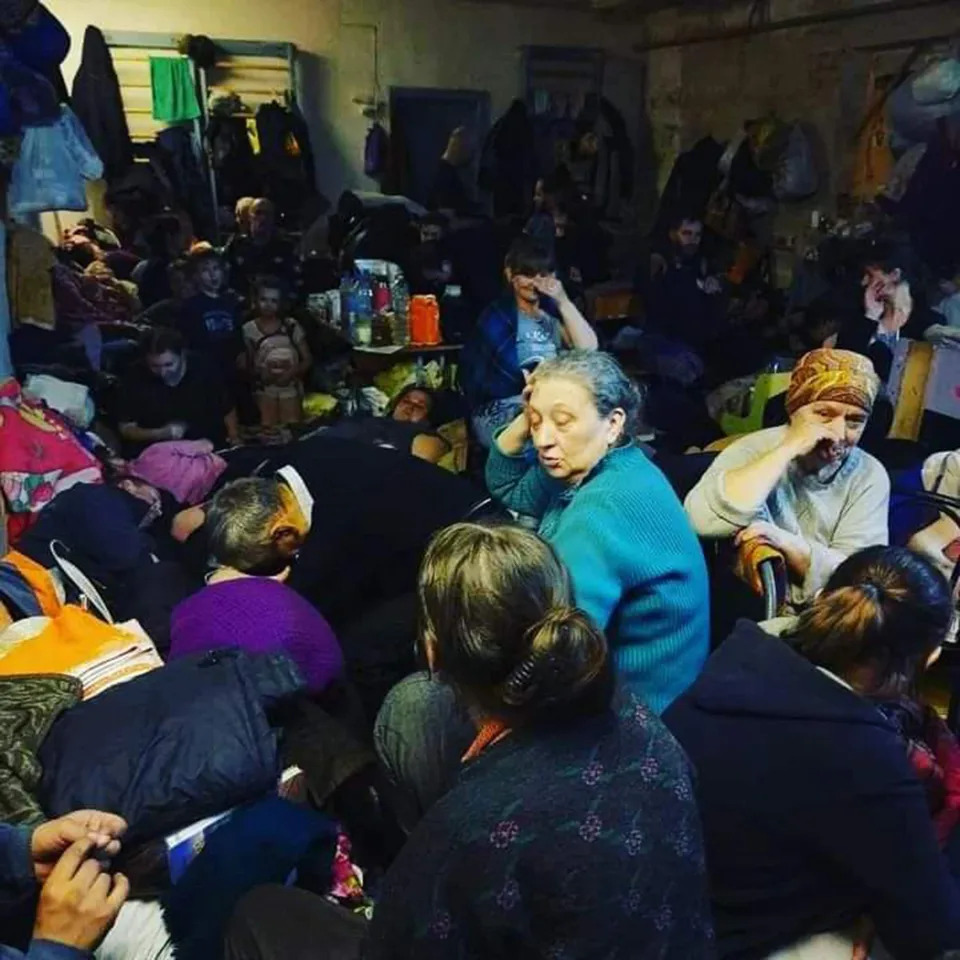
At around 6:30 pm, some of the Ukrainian men trapped in the basement forced the doors open, and found the school and the town deserted. The Russian forces left nothing but destruction in their wake.
“They lived in our houses and after they left everything was damaged,” Lohvynchuk explained. “They stole everything they could, and everything they couldn’t take they just broke or set on fire. I don’t know how to call them people. They are not human beings.”
On March 31, Ukrainian forces arrived at the village, and a group of volunteers helped Lohvynchuk travel to Yagotin, near Kyiv, to live with her daughter, son-in-law, and two granddaughters.
Related: Why one Ukrainian mom wrote family contact information on her daughter’s body
While safe, Lohvynchuk says the horrors of Russian occupation will stay with her forever.
“I have not come back to my senses since this experience,” she explained. “Today my daughter took me to the ophthalmologist, and my eyesight has deteriorated. I believe it’s from the stress.”
“Before the Russian soldiers left, they told us Putin’s plan,” she added. “His plan was to have our village inhabited by the Tuva Republic in Russia. That Ukrainians must be exterminated — no place for them to live here — and Russians would take this land. That was Putin’s plan.”
The stories from civilians in Yahidne could not immediately be verified by TODAY, though the Associated Press has documented the village’s destruction and the civilians being held in a basement as well. Russia has repeatedly denied targeting civilians.
The Resilient Mother
Tetyana Diohtyar, 36, is a mother of three children, ages 10, 4, and 4 months old. Diohtyar lived with her husband and children close to Cherniv, and traveled to Yahidne for refuge after the first Russian bombs fell, assuming the soldiers would not bother to attack such a small town.
She was staying with her husband’s two brothers and their families when the Russian troops invaded Yahidne.
“On March 3, we heard very loud gunfire very close to our building,” Diohtyar told TODAY Parents. “We immediately took all of our kids and very quickly rushed to the cellar.”
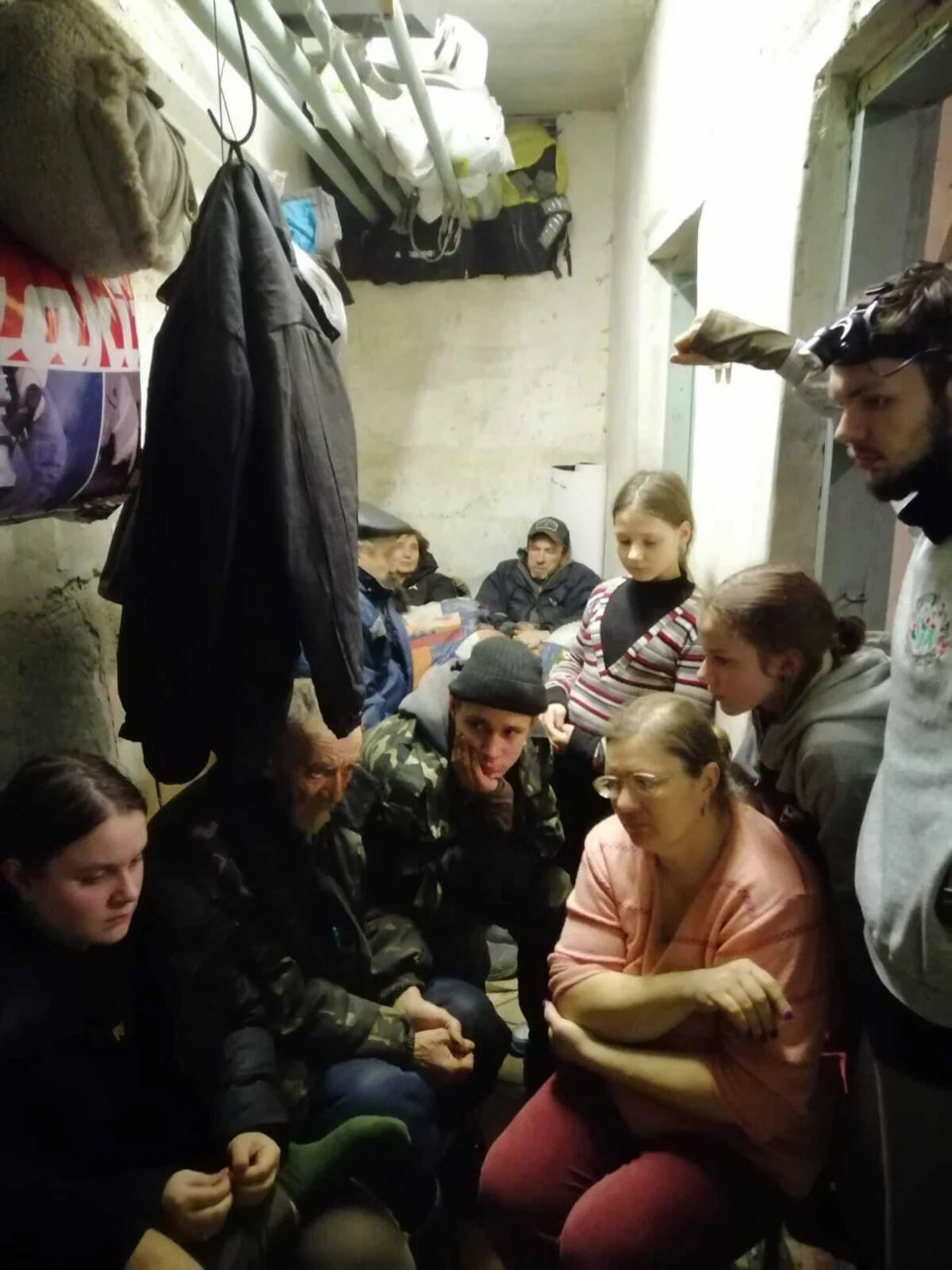
After 20 minutes, the families heard people walking around their home — they were shouting and cursing. They quickly realized the voices were looking for them.
“A bit later, one military man appeared in the cellar,” Diohtyar explained. “I was in panic. I took my youngest son in my arms and I started crying, yelling and imploring him please, for God’s sake, don’t touch us. Don’t kill us. We have only kids here.”
The soldier took her husband and his two brothers away — she did not know what was going to happen to them. The solider only told them to remain in the cellar. Her 10-year-old daughter cried out for her father, begging God to bring him back to her.
The soldiers interrogated her husband, who is a member of a rescue team in Ukraine. After finding what they believed to be a military uniform, they held a gun to his face. It was only after her husband explained that he’s a first responder, not a soldier, that the Russian soldier lowered his weapon.
Related: Biden calls for Putin to face war crimes trial over atrocities in Bucha
After 15 minutes, the men returned to the cellar — the soldiers had searched them and confiscated their cell phones. They then took the older children — ages 15, 18 and 20 — and searched them, too. After finding two computers and their iPhones, the soldiers began to interrogate the children, who are students attending school in Ukraine.
The soldiers stripped the two young men naked, and forced the young woman on her knees.
“They asked them why they had these gadgets and how they got them,” Diohtyar explained. “(The students) explained that they earned money to buy them. The soldiers were surprised that Ukrainians could earn enough money to buy an iPhone.”
“The children could not understand why, as students, they couldn’t have a notebook,” she added. “Why these people didn’t understand these are just things they needed for studying.”
Diohtyar says that once everyone was returned to the cellar, a solider told the family they had been authorized to kill them all.
“They said they would not do it now, though,” she added. “They told us to wait to die until midday tomorrow.”

The next day, the family heard knocking on the cellar door. The soldiers had returned, and told them they had 10 minutes to get to the basement of the village school or they would throw a grenade into the cellar.
The family entered the basement on March 5, and were able to find a small room to house the whole family — 18 people in total.
“We could just sit and sleep while we were sitting,” Diohtyar explained. “We took kids on us — on our bodies. We were sort of making layers of people and younger kids, they were over their mothers’ bodies.”
Diohtyar was breastfeeding, and began to fear she would not have an adequate amount of food to produce enough milk for her then 3-month-old.
“There was a scarcity of food,” she explained. “We ate only once, maximum twice a day. I was all the time trying to drink enough liquid to make sure I would have milk. Luckily, I did have milk to feed my child.”
Related: Russia bombs art school turned shelter: Mariupol ‘wiped off the face of the Earth’
For weeks, the family lived in darkness. Without any electricity, the villagers lit candles, burned oil and lit any cotton they could find on fire. While the weather was brutally cold, inside the crowded basement it grew hot and suffocating. Diohtyar says the inability to breathe is one of the reasons why 11 of the village’s elders perished inside the basement.
“Sometimes they allowed us to take the dead body out on the same day,” she added. “But in some cases, they would allow us to do it on the next day or even two days later.”
To keep the children calm, with the permission of the Russian soldiers the villagers raided the school. They brought the children crayons for them to write on the basement walls, as well as paint and paper. From the kindergarten classes, the adults brought children legos, cars and other toys.
On March 30, Diohtyar says they were beginning to run out of food and asked the soldiers if they could emerge from the basement to gather more bread, cereal and grains. In response, an officer gave the villagers two handwritten copies of a Russian anthem and told the villagers he would allow them to gather more food if they learned the anthem by heart and sang it.
“We refused to do it. We didn’t do it,” Diohtyar said. “Luckily, shortly after that, we were free.”
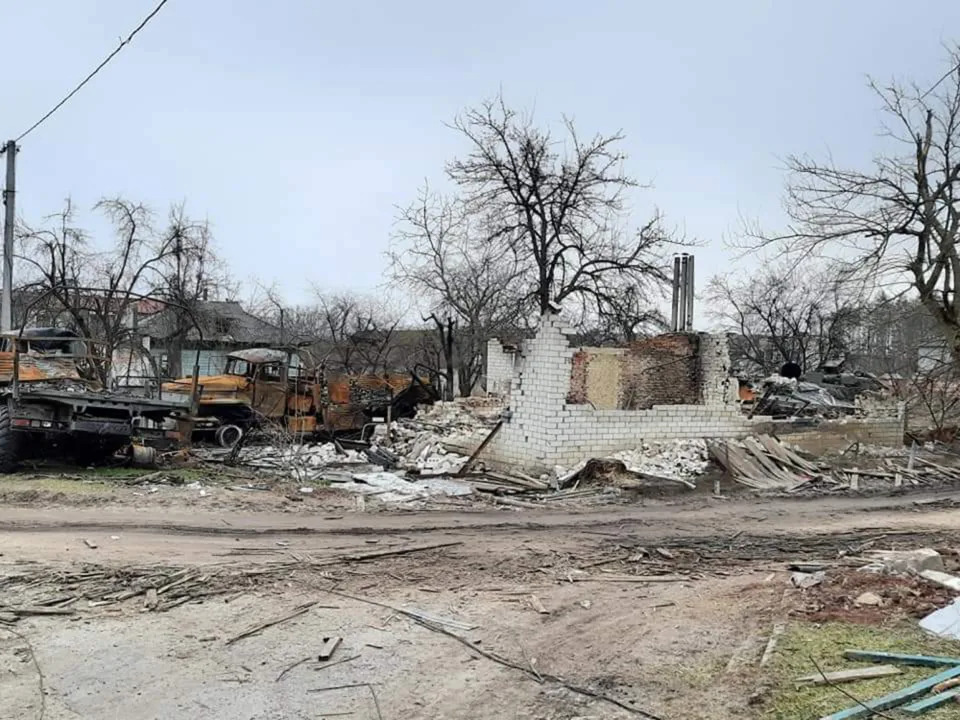
Once liberated, Diohtyar and her family returned to the family’s home only to find it completely destroyed.
“We literally had only the floor and walls left. Everything else — all windows, all furniture, all doors, door frames — they were all broken and burnt,” she said. “They stole our washing machine, mattresses, sofas, and destroyed what they could not take away. We could hardly find anything to take with us. We could not even find clothes for the kids to take with us.”
The family also found their dog lying dead outside, shot by Russian soldiers.
Related: One American left safety behind to care for abandoned animals in Ukraine
Now in western Ukraine, Diohtyar says her 10-year-old daughter cries constantly. But Diohtyar is determined to be strong for her family.
“I am a strong woman. We will go back to our village and rebuild our house. I will plant flowers in the flower beds and eat apples from the apple trees, which we have in the orchard,” she said. “We will plant new trees. My kids are next to me and I will live for my kids.”
“We should not forget about this experience,” she added. “We will overcome it and rebuild our house. Renew everything we can. The most important thing is that we are lucky we have all survived.”
The Courageous Widow
Antonia, 29, who asked that her last name be withheld for her safety, told TODAY Parents that she traveled to Yahidne with her husband and 7-year-old son to stay with her mother, assuming it would be “a much safer place for us to stay, to kind of hide away from the dangers of war.”
Like so many of her fellow Ukrainians, her family hid in the home’s cellar once the Russian shelling began.
“There were three families staying in my mother’s house at first,” Antonia told TODAY Parents. “Our family, my husband and my son; My friend from Cherniv and her son; my step-father’s niece and her husband.”
On March 5, Russian soldiers broke into her mother’s home and found the family hiding.

“There were three men with guns,” she said. “Of course, our kids were very scared. They started crying immediately. The soldiers started yelling at us, asking us, ‘Why are you hiding here?'”
Antonia says they tried to explain to the soldiers that they wanted to stay in their home — they did not want to evacuate. The soldiers demanded everyone give them their cell phones and write down their passwords, then allowed them to return to the cellar. They were told that if they left the cellar for any reason, they would be killed.
“My husband kept one cell phone, and as soon as we got to the cellar he called his mother and told her to delete him from all the chats he was a member of and post on his Facebook page that his phone was in the hands of the Russians,” Antonia said. “He did not want Russians to get his information.”
At that moment, a Russian soldier appeared and caught her husband on the phone. They immediately took him and the other adult man in the cellar away.
“Unfortunately, that was the last moment I saw my husband,” Antonia said. “I managed to tell (the Russian soldiers) not to touch my husband. ‘Don’t touch him,’ I said. These were the last words that were addressed to him and my husband.”
Related: Zelenskyy accuses Russians of ‘genocide’
Her son was sleeping when the soldiers took his dad away. When he awoke, he immediately asked Antonia where his father was.
“I had to tell him that his father was taken to prison. That he’s a prisoner now,” she said. “He was very scared and upset and he kept asking me, ‘Oh, mommy, will we see our father again? How will they treat him? I hope they will not make any pain to him. They will not torture him.’ And I tried to calm our son down. I tried to tell him that everything would be fine.”
Two days later, the soldiers returned, aiming their guns at the remaining family members and ordering them to leave the cellar and go to the village school’s basement.
“We had to run to school — there was constant shelling and explosions around us. Some gunfire. We were very scared and my son was in tears all the time. He was afraid,” Antonia explained. “Then something exploded pretty close to us and we immediately fell to the ground. I was trying to close my son with my body, and when it got quiet he actually started disturbing me and saying, ‘Mommy, mommy, let us quickly run.’ So we started running towards school again.”
Related: First lady of Ukraine shares heartbreaking photos of children killed in the war
Antonia and her family were some of the last villagers to enter the school basement.
Immediately, Antonia tried to find her husband. When she realized he was not in the basement with the others, she began to fear the worst. Determined to focus on her son and the needs of her remaining family members, she tried to find enough room for the family to stand or sit. They began to ration food — the adults often skipped meals in order to feed the children.
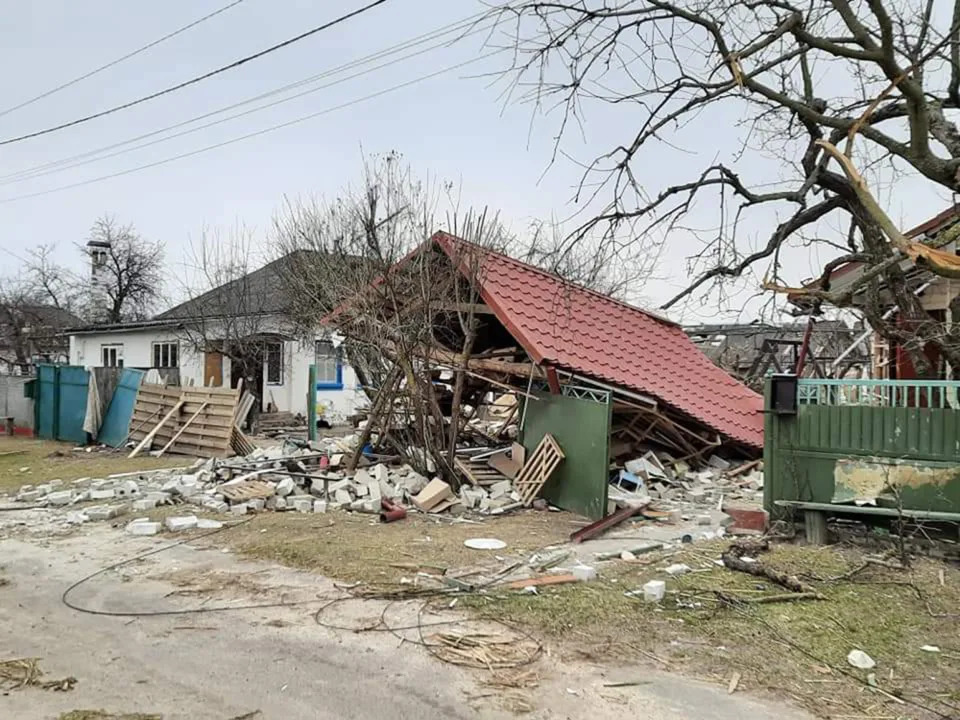
“We were in the basement for 11 days,” Antonia said. “It was the longest 11 days of my life. There was no room to lie down. We tried to sleep while we were sitting next to each other.”
On March 9, a Russian soldier asked a woman in the basement to come with him — he wanted her to identify two dead bodies found in a nearby cellar. When the woman returned, she told the villagers not to worry — the bodies were not local. But a very real chill crept down Antonia’s spine.
“I went up to her and asked her if she could describe their clothes,” Antonia said. “When she described what they were wearing, I understood it was my husband.”
Related: Ukrainian official calls for no-fly zone: We need the protection of the sky
She wanted to openly weep, but she feared drawing attention to herself. If Russian soldiers had decided her husband deserved to die, she thought, what would keep them from deciding she deserved death, too?
“I could not allow myself to express any emotions,” she explained. “I had to subdue my emotions. I cried at night, but only quietly and when no one could see.” She decided not to tell her son anything. Maybe, just maybe, someone else was wearing her husband’s clothes.
“I wanted to have this little hope,” Antonia added. “I could not tell my son that his father was dead.”

After the village was liberated, Antonia was able to communicate with family members back home in Chernihiv. She was told two dead bodies were delivered to a morgue in Chernihiv. Her husband’s cousin had identified one of the bodies as that of her husband. He sent her a picture of her husband’s body.
“I had mentally accepted that my husband was most likely dead,” Antonia said. “So when I saw that picture, the only thing I was thinking was how I was going to tell my son, and how to do it the right way.”
Antonia then called her mother, and it was during her conversation that her 7-year-old overheard her say that her husband had been killed.
“He immediately asked me, ‘So, what do you mean? You mean I don’t have a father? Where’s my father? Will he come back? Do you mean he won’t come back? You mean I will not see him again?'” she said. “And I said, ‘Yes, unfortunately you are correct. Your father is no longer alive.'”
Related: Inside the daring rescue that saved dozens of Ukrainian orphans
Before the war, Antonia had lost her step-father. When describing his death to her son, she would tell him that his grandfather was no longer living on earth, but in the sky — he was now a star. Upon learning his father had died, her young son leaned on that same understanding.
“Immediately, when he understood his father was dead, he asked me, ‘So, our father is also a star now?'” she explained. “And I told him, ‘Yes, he is a star.’ Then that night, we went out in the dark, looked up at the sky and tried to find his grandfather and father in the stars.”
Antonia and her husband celebrated their 8th wedding anniversary on Feb. 25. She says he was a wonderful man and father, who was dedicated to his job and had a lot of friends — friends who are now helping to care for Antonia and her son, who are now safely in Poland.
She says her husband also loved to fish — a hobby Antonia’s son also grew to enjoy. The two used to bet on who could catch the most fish. Now, Antonia says her son will catch fish for his father.
“My son is my purpose in life now,” she added. “I will keep living for him.”
